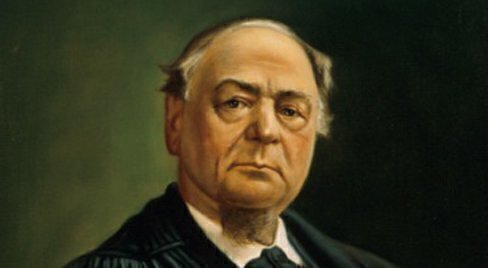On this day in 1862, Noah Swayne was confirmed by the Senate to replace Justice John McLean, one of two dissenters in the Dred Scott decision along with Benjamin Roberts Curtis.
 Swayne moved out of Virginia at the tender age of 19 due to his opposition to slavery to Ohio as a devout Quaker (the first and only Quaker on the Supreme Court), where he began his political career in the state legislature. From there, he was appointed United States Attorney for Ohio by President Andrew Jackson. However, he retained his anti-slavery views and by 1855, joined the newly created Republican Party.
Swayne moved out of Virginia at the tender age of 19 due to his opposition to slavery to Ohio as a devout Quaker (the first and only Quaker on the Supreme Court), where he began his political career in the state legislature. From there, he was appointed United States Attorney for Ohio by President Andrew Jackson. However, he retained his anti-slavery views and by 1855, joined the newly created Republican Party.
McLean, who unsuccessfully sought the Republican nomination for President in 1860, told Abraham Lincoln on numerous occasions that Swayne, his close personal friend from Swayne’s days as U.S. attorney, should be his replacement. When McLean died in April 1861 just the Civil War was breaking out, Swayne did not hesitate to campaign for the spot. In fact, Swayne mobilized the Ohio congressional delegation to support his appointment. Swayne eventually got the nomination on January 21, 1862, because he fit Lincoln’s criteria: commitment to the Union, a longtime opponent of slavery, and a geographical fit, as he would be the only native Southerner appointed to the Court during the Civil War. Swayne also had a strong legal reputation, as the New York Post praised him as having an “enviable reputation” as a lawyer and among the best members of the bar. Swayne was also thought to be ambitious. As the Washington Star wrote upon his confirmation on January 24, 1862, his “fame is equal to his reputation as a lawyer.”
As a member of the Court, Swayne is known for writing few opinions, yet he was also an important vote in upholding numerous actions of the Lincoln administration. He joined the majority in the Prize Cases, upholding Lincoln’s 1861 blockade of Southern ports issued without Congressional authorization, and after the war, voted to uphold the federal government’s issuing of paper money in the Legal Tender Cases and the use of military trials for civilians in Ex Parte Milligan. He also wrote the majority opinion in 1869 in Pacific Insurance Co. v. Soule upholding the 1864 income tax created to pay for the war. However, in one major case, Swayne dissented from the administration’s policy, in a July 1862 charge to a Circuit Court jury arguing that domestic rebels could not be “enemies” within the meaning of “treason” under federal law or the Constitution. An open act of levying war was required. Swayne believed war did not expand the meaning of treason, despite the “causeless and wicked” nature of the rebellion.
Otherwise, Swayne wrote two other impactful decisions. In the 1864 case of Gelpke v. Dubuque, which involved the validity of railroad bonds, he found that because state court precedents on the question of the validity of the bonds in question were inconsistent, federal courts could properly interpret the state constitution. Thus, Swayne expanded federal judicial power in upholding the validity of the bonds in question.
Years later, in the first significant case interpreting the 14th Amendment, the Slaughterhouse Cases, Swayne dissented from Justice Miller’s majority, which decided that the 13th and 14th Amendments merely meant to protect newly freed African-Americans’ civil rights and states maintained their police powers to regulate the public health and safety. While Justice Stephen Field and Joseph Bradley focused on the liberty protected under the “privileges or immunities” and Due Process clauses of the 14th Amendment, Swayne focused on the vast change brought upon the Constitution by the new amendments. Swayne disagreed vehemently with Miller’s statement that the Reconstruction Congress could not possibly have meant to bring about a Constitution Revolution through the Civil War Amendments, stating that, “These amendments are a new departure, and mark an important epoch in the constitutional history of the country. They trench directly upon the power of the States, and deeply affect those bodies. They are, in this respect, at the opposite pole from the first eleven.” The result of the Civil War meant that citizens now had to be wary of the tyranny of state governments. Thus, these amendments, Swayne felt, “rise to the dignity of a new Magna Charta.”
Swayne also steadfastly desired the Chief Justiceship, attempting twice to secure the position. First, he campaigned for it upon Chief Justice Roger Taney’s death in November 1864. Later in 1873, upon the death of Chief Justice Salmon Chase, Swayne was among the names being considered by President Ulysses Grant as a replacement. However, Grant felt that Swayne, close to 70, was too old and instead picked the relatively unknown fellow Ohioan Morrison Waite.
Swayne may be remembered as a limited writer despite his time on the Court, but his dissent in Slaughterhouse as well as on the question of the limits of treason show his deep commitment to Republican principles he brought to the Supreme Court.
Nicholas Mosvick is a Senior Fellow for Constitutional Content at the National Constitution Center.







